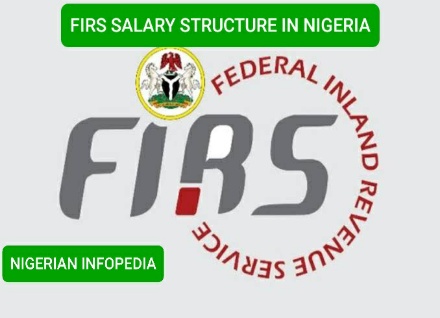FIRS Salary Structure in Nigeria: How Much Staff Are Paid (2024)
A lot of graduates have become interested in the amount of money staffs of the FIRS earn per month. Before we delve into this article, we would investigate the salary structure of the Federal Inland Revenue Service in Nigeria. The only government based institution that has the task of collecting and collating Federal Government taxes. Before we proceed with the FIRS salary structure, let’s look at their functions.

Functions of the Federal Inland Revenue Service (FIRS) in Nigeria
- They give taxpayers the Moral ground and legal right to demand a standard of accountability.
- The FIRS Provide funds for the government to use for governance, social services, public services and for the development of the economy.
- Another function of the FIRS is to provide civic responsibility to citizens.
- They help in the redistribution of wealth. They help to maintain the bridge between the standard of living.
- The FIRS serve as a metric for measuring the growth and the level of the health of the economy. With the aid of the FIRS, one can always measure the level of development of a state or country.
- The FIRS, depend on the Tax compliance status of business organizations, or corporate bodies to estimate the benefits and privileges that should be accrued to them. The function of the Tax compliance metric is to give law-abiding citizens a way to avoid the penalties and sanctions of non-compliance with tax laws.
Now that we have been acquainted with the functions of the FIRS, let’s proceed to the topic of the day-“How much does the Federal inland Revenue service Earn”
How Much Does Federal Inland Revenue Service Pay Corpers (2024)
NYSC Youth corpers working at the Federal Inland Revenue Service (FIRS), receives a monthly salary of ₦34,000 to ₦46,000 on average per month. This figure proves that FIRS is one of the highest federal agencies that pay youth corpers well in the country.
How Much Does The Federal Inland Revenue Service (FIRS) Pay Their Staff in Nigeria Monthly?
You may probably want to know how much the FIRS pays their staff monthly before submitting that application. Well, this article will give you that information.
The Federal Inland Revenue Service has a salary structure for their staff and this depends on certain factors such as grade level, years of service, and position occupied in the organization.
According to workforgov.ng, entry level staff on grade 8 in the FIRS receive a monthly salary of ₦103,987 whereas a grade 7 staff in the FIRS earn ₦89,434 monthly as salary. These amount is before pension and tax deductions. However, apart from basic salary, FIRS staff are entitled to some allowances and benefits. Also, salary increases as your years of service increases.
In a very simple table format, we would be sharing the salary of different job positions in the FIRS. (culled from Glassdor.com)
| Job Position | Average Salary Per Month (Naira) |
| Youth corper –Monthly Intern | ₦34,000 – ₦46,000 |
| Assistant manager | ₦310,000 – ₦331,000 |
| Tax Administrator | ₦360,000 – ₦342,000 |
| Conseiller En Développement – Monthly | ₦279,000 – ₦298,000 |
| INSPECTOR of TAXES | ₦382,000 – ₦412,600 |
| Accounting Clerk – Monthly Intern | ₦67,000 – ₦73,000 |
|
Accountant – Monthly |
₦198,000 – ₦211,000 |
| Human Resources Generalist – Monthly | ₦479,000 – ₦517,000
|
| VAT officer (corper) – Monthly | ₦24,000 – ₦26,000 |
| Tax Officer | ₦289,600 – ₦310,000 |
| Corps Member – Monthly | ₦24,000 – ₦26,000 |
The sole job of tax officers is to promote services that are related to the growth of the economy of a nation in different sectors.
They help to enforce the corporate responsibility of other citizens in Nigeria. With tax services offered by the FIRS, there is an even redistribution of wealth within the Nigerian populace. The FIRS investigate the general wealth of people. A career with the FIRS can be quite an adventure.
Overview of FIRS
The Federal Inland Revenue Service was founded in the year 1943. It is a structure under the department of Inland Revenue. Their main purpose upon founding is to work as a tax system. They monitor the tax activity of Nigerian citizens.
Their vision as this finance bureau is to deliver quality service to all taxpayers and use the tax as the means for national development. Here are the following qualities
- Professionalism
- Respect to taxpayers
- Continuous learning
- Fairness
- Accountability
- Information Sharing
- Collaborative Decision Making
- Competence
- Self-Discipline
- Speed
- Efficiency
- Team Spirit
- Partnering
- Transparency
If you have intentions of working with the Federal inland Revenue services, then you need to acquaint yourself, with the above-listed core values. That is the only way you can turn out to be a tax officer in Nigeria
The Organizational Structure of the Federal Inland Revenue Service
Anything that has a bureaucratic front can only survive with a structure. A hierarchy is always important, as it helps in placing order within the system. Now, let us take a look at the organisational structure of the FIRS.
In accordance with the FIRS ACT, the Federal Inland Revenue Service has the following organizational structure:
- The Executive chairman
- Nine members that have relevant expertise appointed by the President of the Federal Republic of Nigeria, to represent the 9 geo-political zones of Nigeria.
- Someone that represents the attorney-General of the Federal Republic of Nigeria
- A representative of the Minister of Finance of the federation
Chairman of Revenue mobilization, Fiscal commission and Allocation - Group of managing directors of the NNPC
- The Comptroller General of the NCS-Nigerian Customs Service
- The Registrar General of the CAC- cooperate affairs commission
- The Cheif Executive Officer of the National Planning Commission (NPC).
At the time of writing this article, the new executive chairman of the FIRS is Muhammad Mamman Nami
What are the Mandates and Operations of the FIRS?
- On an administrative basis, the responsibility of the FIRS is to assess, collect and give an auditory account of the taxes to the Nigerian Federal Government. Let us look at other mandates of the FIRS.
- They Prompt provision and publication of data and annual reports to the government. They publish data that is related to economic planning, academic research, tax policy and legislation the government
- The FIRS provide tax advisory services to the general public.
- They issue Taxpayer Identification number at zero cost to a taxpayer
- The FIRS processes prompt tax refund requests
- They educate Nigerians on tax-related issues through different media mediums and languages.


